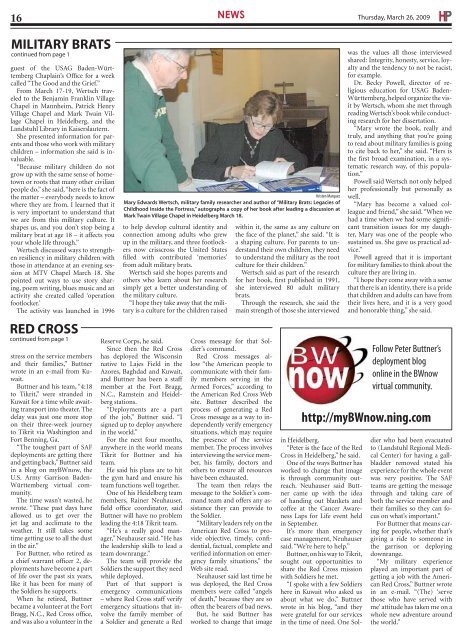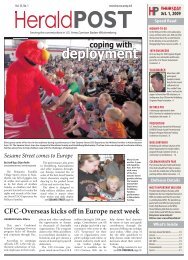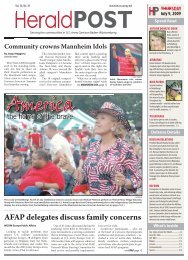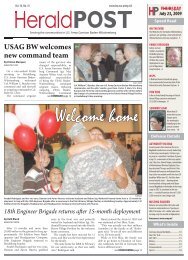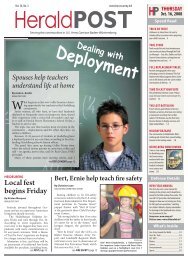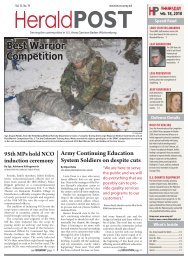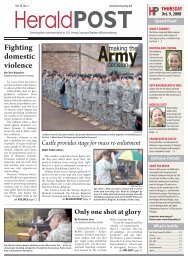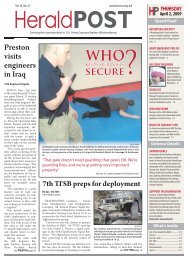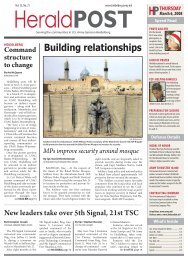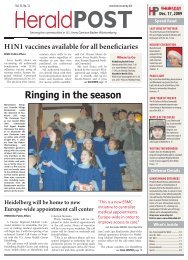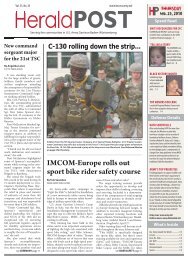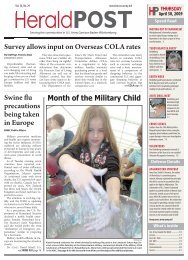Herald Post 2009-03-26.pdf
Herald Post 2009-03-26.pdf
Herald Post 2009-03-26.pdf
Create successful ePaper yourself
Turn your PDF publications into a flip-book with our unique Google optimized e-Paper software.
16 NEWS<br />
Thursday, March 26, <strong>2009</strong> HP<br />
MILITARY BRATS<br />
continued from page 1<br />
guest of the USAG Baden-Württemberg<br />
Chaplain’s Office for a week<br />
called “The Good and the Grief.”<br />
From March 17-19, Wertsch traveled<br />
to the Benjamin Franklin Village<br />
Chapel in Mannheim, Patrick Henry<br />
Village Chapel and Mark Twain Village<br />
Chapel in Heidelberg, and the<br />
Landstuhl Library in Kaiserslautern.<br />
She presented information for parents<br />
and those who work with military<br />
children – information she said is invaluable.<br />
“Because military children do not<br />
grow up with the same sense of hometown<br />
or roots that many other civilian<br />
people do,” she said, “here is the fact of<br />
the matter – everybody needs to know<br />
where they are from. I learned that it<br />
is very important to understand that<br />
we are from this military culture. It<br />
shapes us, and you don’t stop being a<br />
military brat at age 18 – it affects you<br />
your whole life through.”<br />
Wertsch discussed ways to strengthen<br />
resiliency in military children with<br />
those in attendance at an evening session<br />
at MTV Chapel March 18. She<br />
pointed out ways to use story sharing,<br />
poem writing, blues music and an<br />
activity she created called ‘operation<br />
footlocker.’<br />
The activity was launched in 1996<br />
RED CROSS<br />
continued from page 1<br />
stress on the service members<br />
and their families,” Buttner<br />
wrote in an e-mail from Kuwait.<br />
Buttner and his team, “4:18<br />
to Tikrit,” were stranded in<br />
Kuwait for a time while awaiting<br />
transport into theater. The<br />
delay was just one more stop<br />
on their three-week journey<br />
to Tikrit via Washington and<br />
Fort Benning, Ga.<br />
“The toughest part of SAF<br />
deployments are getting there<br />
and getting back,”Buttner said<br />
in a blog on myBWnow, the<br />
U.S. Army Garrison Baden-<br />
Württemberg virtual community.<br />
The time wasn’t wasted, he<br />
wrote. “These past days have<br />
allowed us to get over the<br />
jet lag and acclimate to the<br />
weather. It still takes some<br />
time getting use to all the dust<br />
in the air.”<br />
For Buttner, who retired as<br />
a chief warrant officer 2, deployments<br />
have become a part<br />
of life over the past six years,<br />
like it has been for many of<br />
the Soldiers he supports.<br />
When he retired, Buttner<br />
became a volunteer at the Fort<br />
Bragg, N.C., Red Cross office,<br />
and was also a volunteer in the<br />
Kristen Marquez<br />
Mary Edwards Wertsch, military family researcher and author of “Military Brats: Legacies of<br />
Childhood Inside the Fortress,” autographs a copy of her book after leading a discussion at<br />
Mark Twain Village Chapel in Heidelberg March 18.<br />
to help develop cultural identity and<br />
connection among adults who grew<br />
up in the military, and three footlockers<br />
now crisscross the United States<br />
filled with contributed ‘memories’<br />
from adult military brats.<br />
Wertsch said she hopes parents and<br />
others who learn about her research<br />
simply get a better understanding of<br />
the military culture.<br />
“I hope they take away that the military<br />
is a culture for the children raised<br />
Reserve Corps, he said.<br />
Since then the Red Cross<br />
has deployed the Wisconsin<br />
native to Lajes Field in the<br />
Azores, Baghdad and Kuwait,<br />
and Buttner has been a staff<br />
member at the Fort Bragg,<br />
N.C., Ramstein and Heidelberg<br />
stations.<br />
“Deployments are a part<br />
of the job,” Buttner said. “I<br />
signed up to deploy anywhere<br />
in the world.”<br />
For the next four months,<br />
anywhere in the world means<br />
Tikrit for Buttner and his<br />
team.<br />
He said his plans are to hit<br />
the gym hard and ensure his<br />
team functions well together.<br />
One of his Heidelberg team<br />
members, Rainer Neuhauser,<br />
field office coordinator, said<br />
Buttner will have no problem<br />
leading the 4:18 Tikrit team.<br />
“He’s a really good manager,”<br />
Neuhauser said. “He has<br />
the leadership skills to lead a<br />
team downrange.”<br />
The team will provide the<br />
Soldiers the support they need<br />
while deployed.<br />
Part of that support is<br />
emergency communications<br />
– where Red Cross staff verify<br />
emergency situations that involve<br />
the family member of<br />
a Soldier and generate a Red<br />
Cross message for that Soldier’s<br />
command.<br />
Red Cross messages allow<br />
“the American people to<br />
communicate with their family<br />
members serving in the<br />
Armed Forces,” according to<br />
the American Red Cross Web<br />
site. Buttner described the<br />
process of generating a Red<br />
Cross message as a way to independently<br />
verify emergency<br />
situations, which may require<br />
the presence of the service<br />
member. The process involves<br />
interviewing the service member,<br />
his family, doctors and<br />
others to ensure all resources<br />
have been exhausted.<br />
The team then relays the<br />
message to the Soldier’s command<br />
team and offers any assistance<br />
they can provide to<br />
the Soldier.<br />
“Military leaders rely on the<br />
American Red Cross to provide<br />
objective, timely, confidential,<br />
factual, complete and<br />
verified information on emergency<br />
family situations,” the<br />
Web site read.<br />
Neuhauser said last time he<br />
was deployed, the Red Cross<br />
members were called “angels<br />
of death,” because they are so<br />
often the bearers of bad news.<br />
But, he said Buttner has<br />
worked to change that image<br />
within it, the same as any culture on<br />
the face of the planet,” she said. “It is<br />
a shaping culture. For parents to understand<br />
their own children, they need<br />
to understand the military as the root<br />
culture for their children.”<br />
Wertsch said as part of the research<br />
for her book, first published in 1991,<br />
she interviewed 80 adult military<br />
brats.<br />
Through the research, she said the<br />
main strength of those she interviewed<br />
was the values all those interviewed<br />
shared: Integrity, honesty, service, loyalty<br />
and the tendency to not be racist,<br />
for example.<br />
Dr. Becky Powell, director of religious<br />
education for USAG Baden-<br />
Württemberg, helped organize the visit<br />
by Wertsch, whom she met through<br />
reading Wertsch’s book while conducting<br />
research for her dissertation.<br />
“Mary wrote the book, really and<br />
truly, and anything that you’re going<br />
to read about military families is going<br />
to cite back to her,” she said. “Hers is<br />
the first broad examination, in a systematic<br />
research way, of this population.”<br />
Powell said Wertsch not only helped<br />
her professionally but personally as<br />
well.<br />
“Mary has become a valued colleague<br />
and friend,” she said. “When we<br />
had a time when we had some significant<br />
transition issues for my daughter,<br />
Mary was one of the people who<br />
sustained us. She gave us practical advice.”<br />
Powell agreed that it is important<br />
for military families to think about the<br />
culture they are living in.<br />
“I hope they come away with a sense<br />
that there is an identity, there is a pride<br />
that children and adults can have from<br />
their lives here, and it is a very good<br />
and honorable thing,” she said.<br />
Follow Peter Buttner’s<br />
deployment blog<br />
online in the BWnow<br />
virtual community.<br />
http://myBWnow.ning.com<br />
in Heidelberg.<br />
“Peter is the face of the Red<br />
Cross in Heidelberg,” he said.<br />
One of the ways Buttner has<br />
worked to change that image<br />
is through community outreach.<br />
Neuhauser said Buttner<br />
came up with the idea<br />
of handing out blankets and<br />
coffee at the Cancer Awareness<br />
Laps for Life event held<br />
in September.<br />
It’s more than emergency<br />
case management, Neuhauser<br />
said. “We’re here to help.”<br />
Buttner, on his way to Tikrit,<br />
sought out opportunities to<br />
share the Red Cross mission<br />
with Soldiers he met.<br />
“I spoke with a few Soldiers<br />
here in Kuwait who asked us<br />
about what we do,” Buttner<br />
wrote in his blog, “and they<br />
were grateful for our services<br />
in the time of need. One Soldier<br />
who had been evacuated<br />
to (Landstuhl Regional Medical<br />
Center) for having a gallbladder<br />
removed stated his<br />
experience for the whole event<br />
was very positive. The SAF<br />
teams are getting the message<br />
through and taking care of<br />
both the service member and<br />
their families so they can focus<br />
on what’s important.”<br />
For Buttner that means caring<br />
for people, whether that’s<br />
giving a ride to someone in<br />
the garrison or deploying<br />
downrange.<br />
“My military experience<br />
played an important part of<br />
getting a job with the American<br />
Red Cross,” Buttner wrote<br />
in an e-mail. “(The) ‘serve<br />
those who have served with<br />
me’ attitude has taken me on a<br />
whole new adventure around<br />
the world.”


